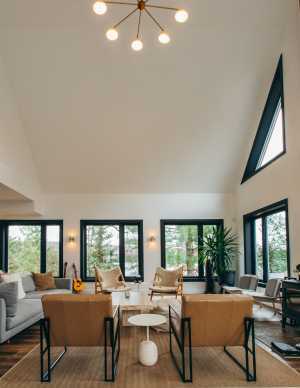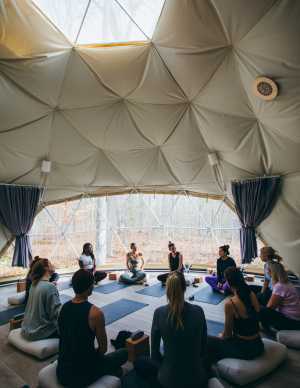My toes are dancing. Tapping the air. Wriggling with glee. For a second — or maybe an hour (who can say?) — I’m miles from my consciousness, with only my extremities joyfully responding to the plucking of a mysterious string instrument somewhere above my head. Then, just as the two psychotherapists and the plant elder (yes, that’s the job title) break into off-key a cappella harmony, I crash back to reality.
This is the peak of Dimensions Algonquin Highlands’ five-day “Ascend” retreat — or at least, the moment everything had been building toward. Picture this: five professional women (all journalists) lying supine in a geodesic dome nestled in the woods after consuming copious quantities of cannabis, while psychotherapists and a plant elder, who looks like a yogi version of Larry David, buzz around, playing esoteric instruments and singing.
As someone generally averse to ‘woo’ and not exactly friendly with weed (it makes me anxious rather than calm), this hardly seems like the right prescription for me. Yet here I am, deep in it — and trying, really trying, to buy into Dimensions’ promise of a reset. My goal? To write at least one poem. It’s been years since I’ve managed to pen even a lazy stanza, let alone anything decent. Clearly, some mental block has been in the way.

This five-day retreat stretches reality like taffy, offering an experience I best describe as Ayahuasca Lite™ — without the soul-warping psychedelics. Co-founded by Christopher Dawson and Andrew Galloway, an entrepreneurial duo with ties to addiction treatment and Bay Street capital, Dimensions was created to push wellness beyond mere pampering. Their mission? According to Dawson, it’s to spark real, measurable shifts in how people feel and engage with the world — and with themselves.
While traditional Ayahuasca ceremonies often unfold in remote Amazonian settings, filled with ancestral chants and intense purges that are deeply rooted in Indigenous cultures and spiritualities, this Canuck camp is a much gentler, more luxurious affair. Instead, the retreat sticks to legal, mind-bending plants like cannabis, keeping everything above board with Canadian laws. But don’t be fooled: This is no run-of-the-mill wellness retreat. After all, anything that leaves you gazing into the void while three adults harmonize about self-love over you is far from orthodox.

For those hoping for a quick drug-assisted fix to mid-career burnout, Dimensions might seem like the perfect escape: five days in a 40-acre Algonquin sanctuary, with a relaxation-packed itinerary of massages, forest bathing, gentle yoga and breathwork sessions, all culminating in a cannabis-fuelled finale. But guests can’t simply roll in for a tune-up. This retreat requires work.
Before you even make the three-hour trek northeast of Toronto, there’s a series of psychological assessments, intro psychotherapy sessions and virtual group meetings. It’s all designed to ensure you’re not just escaping your inbox, but actually doing the mental legwork — plenty of introspection and goal-setting — before you even set foot on the grounds. This is, after all, a cannabis-assisted psychedelic therapy retreat, not a weed-induced spa-cation.

Once you’ve conquered the digital mountain of paperwork, Dimensions rewards you with an immersive experience that perfectly blends ruggedness with indulgence. The sprawling property features 17 private cabins, either perched along Maple Lake or tucked beneath towering pines in the forest. Originally a simple, no-frills family retreat, the property has been thoughtfully retrofitted by Toronto’s DesignAgency, which repurposed the existing cabin footprints to ensure that nature still takes centre stage (and not a single tree was felled).

Inside, the cabins are pure Scandi bliss — think heaps of oak and limestone, cozy window seats and expansive picture windows that blur the line between indoors and out. No art, no TVs, just panoramic views of the forest. Every detail is designed to lull you into a state of deep relaxation: spa-worthy soaker tubs for meditative baths, blackout blinds for undisturbed REM cycles and cloud-like Canadian-made Obasan mattresses. The result? A tranquillity so profound, it feels like the Haliburton wilderness itself is tucking you in at night.
The cabins aren’t the only spaces designed with relaxation in mind. The main lodge, complete with spa rooms, and the geodesic dome where cannabis-assisted therapy happens, both take serenity to the next level. In addition, there are kilometres of nature trails to explore, with plans in the works for a new main lodge (the current one is a retrofitted structure); an apiary; and a scent garden planted with lavender, mint, thyme and sage. These are still early days for Dimensions, but the groundwork has been laid — quite literally — for a retreat that promises a double dose of nature and relaxation.

By day two of the retreat, the compulsive urge to answer emails has finally abated. Between the programming (more massages, woe is me) and my cabin oasis, I’m so rested I almost feel guilty when my only “busy” task is floating in a sensory deprivation tank or stretching through sunrise Tai Chi. But deep relaxation isn’t just a happy side effect — it’s the whole point. Dimensions’ clinical director, Donald Currie, has carefully designed a program that disarms overstimulated urbanites with an itinerary of back-to-back somatic therapies.
Somatic therapies use the body to relax the mind. Breathwork, for example, triggers the vagus nerve, the body’s “chill out” button, to reduce stress. Currie explains these practices with scientific authority, citing studies that show how breathwork and other techniques, like bodywork, guided movement and mindfulness can override the brain’s stress responses, leading to deep relaxation. The goal? Align the body so the mind can follow.

Everything at Dimensions is designed to soothe the nerves — from the complimentary CBD drinks in the mini-fridge to the muted decor and sunset sound baths. Still, there is a low hum of anxiety I can’t quite shake. As a control freak who’s never been fond of weed, I’m nervous about the looming event on the itinerary. The zen-inducing activities are all well and good, but I can’t stop fixating on what they’re building up to: the “plant ceremony” — a whole day dedicated to consuming cannabis.
Currie and the other retreat leader, both psychotherapists, constantly speak about the power of psychedelic plants and somatic therapies. It isn’t just a side note; it’s central to the Dimensions curriculum. From cannabis to cacao, these legal mind-altering plants are woven into the programming, nudging guests toward deeper introspection. But the thought of being high around my peers makes me anxious — nothing says bonding like realizing you’ve forgotten how to use your hands in front of a room full of strangers.

Much of Dimensions’ programming initially strikes me as a bit Goop-y, like something Gwyneth Paltrow might dream up post-juice cleanse. But to my surprise, they back it up with legitimate academic credentials. Dimensions partners with Queen’s University to support its evidence-based approach to wellness.
“We’re taking a neuroscientific approach to mental wellness as opposed to psychiatric,” co-founder Chris Dawson explains. “The central nervous system is essential to understanding wellness. It’s the core connector between the mind and body. We focus on elements of the body because they help condition individuals for the mental shifts that will follow. Sound baths and breathwork, when curated and delivered by professionals, produce not just neuro-psychotherapeutic effects, but deeper results than what a casual practitioner might achieve.”

But it’s not all science-sanctioned sing-a-longs and drug-addled afternoons. Behind the retreat’s otherworldly vibe is a highly calculated business vision. Co-founder Andrew Galloway comes from an equity fund background, so while there’s a lot of ‘feelgoodery’ at the heart of Dimensions, there’s likely a solid business plan, too. Though never explicitly mentioned by anyone affiliated with the retreat, it’s evident that Dimensions is strategically positioning itself for the potential legalization of psychedelics, particularly mushrooms.
Still, despite the suspected business savvy, the heart of Dimensions is about connection and healing. As Dawson puts it, “Community, in all its forms, is key to improving mental health. Even dinner is designed to be a therapeutic conversation.”
At Dimensions, meals are served around a 16-person harvest table, with at least two staff members — typically a psychotherapist or the plant elder — joining in. The goal is to foster open dialogue, making the meal itself part of the healing process. The food fits seamlessly into Dimensions’ mind-body rewiring framework: thoughtfully cooked with fermented ingredients, minimal meat and nothing artificial. It’s surprisingly delicious for something so virtuous.
In addition to these informal meal gatherings, there are formal group-sharing sessions led by the retreat’s psychotherapists. Group sharing and collective healing are central to the Dimensions experience. You’re not just expected to be open and honest with yourself or your therapist (with whom
you get a one-on-one session at the end of the retreat), but also with a group of strangers — each on their own winding road to self-discovery.

At first, it’s jarring to bare your soul to people you’ve just met, but that shared vulnerability is part of the process. In a world where traditional spaces for confession and catharsis — like religion — are fading, Dimensions offers a rare opportunity to release your anxiety, shame and worry without fear of judgement. Instead, you’re met with support and empathy. The idea is that spilling your guts to fellow journeyers builds trust and connection, turning what could be an awkward encounter into something unexpectedly therapeutic.
Despite the mindfulness and relaxation, one burning question seems to linger: How much weed are we actually going to smoke? We’d been told to bring 10 grams each, which seems... very ambitious. Are we gearing up for some kind of endurance event?

In the prep session the night before the cannabis portion of the programming, retreat leader Currie and his psychotherapist colleague start calling plain old pot “the medicine” and referring to our forthcoming Mary Jane marathon as “the plant ceremony,” and it begins to feel less like science and more like half-baked mysticism. It’s starting to feel less about unwinding and more like I’m about to join a very mellow herbalist cult.
Inheritance by Caroline Aksich
Splat.
A bright red berry blotch on stark white plants.
An inedible red splotch. An illegible scarlet letter.
Not a scarlet letter — something more mundane, but still, it lingers.
My mother (the version of her from 1992) stands in the doorway, her scowl sharp, slicing the thick summer air, while a war gnaws Yugoslavia to its bones.
And there I am — the self I carry still: Too fast, too furious, too unkempt.
Always hungry, flitting, simmering, spilling crumbs.
Never poised, never a lady.
Always just hoovering the parts of life
Devouring the scattered bits meant to be savoured, not swallowed.
Ravenous for everything — for life, for berries swollen in July’s heat, baptized in June’s relentless rain.
The stain will come out.
Or at least enough of it, so that when you look (from a distance) they’re nearly stark white.
So, the next day, in the middle of the plant ceremony, when three grown adults start singing earnestly about how I need to let love wash over me because I’m worthy of it, I can’t help but burst out laughing — a deep, belly-aching, uncontrollable laugh. It’s all just too absurd. Here I am, being fanned with grass by hippie Larry David, while my very stoned brain ping-pongs between the ridiculousness of the moment, the fact that sharks are severely misunderstood and, of course, my looming anxieties about the next chapter of my life. It’s a surreal mix of spiritual self-discovery and stoner comedy. No one seems to notice my laughing, and if they do, I don’t notice them.
The next day, during my solo psychotherapy session, I surprise myself. In the middle of some earnest self-reflection, I suddenly tear up. The absurdity of the whole plant ceremony — lying there for four hours, smoking weed while grown adults sang endless songs about self-love and inner light — has softened me. Something struck a nerve and brought on a visceral reaction. It wasn’t that I’d consciously decided to drop my guard; it was more like the sheer earnestness and absurdity of the whole experience had disarmed me. Their over-the-top sincerity cracked me open.
And then, for the first time in maybe 10 years, a poem fell out of me. Maybe it was the marijuana jostling something loose, maybe the week of introspection, the cringey singing or maybe the magic in that grass fan. But before I slip back into my smug, uptight urbanite self, I’m going to do something I haven’t done in a long time: share a poem — a very personal one, I might add — with strangers. Because after a week of baring my soul to a room of strangers, why stop now?
